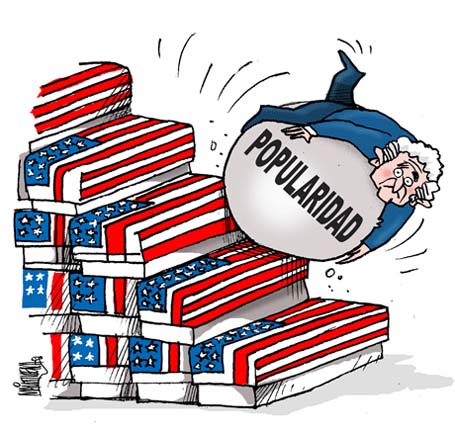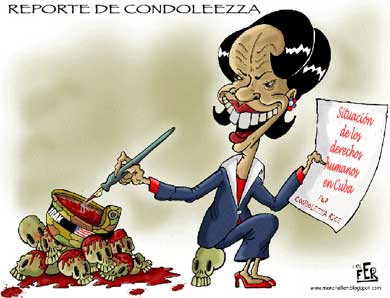Bush, health and education
posted by F Espinoza | 16.07.2007 12:38 | Education | Health | London


I will not refer to Bush's health and education, but to that of his neighbors. It was not an improvised declaration. The AP agency tells us what his opening words were: "Tenemos corazones grandes en este país" (We have big hearts in this country); he said this in Spanish in front of 250 representatives of private and religious groups, foundations and NGOs who had come to Washington with all expenses paid by his government. Of these, some 100 came from the United States.
“The meeting, called the White House Conference on the Americas, is part of the ideas outlined by Bush as he began a tour of five Latin American countries at the beginning of March about what his government was hoping to do for the region in the short time still remaining of his term in office.”
“Bush called the conference in order to discuss several subjects, especially education and health. ‘It’s … in the interests of the United States that our neighborhood be healthy and educated', he said in improvised declarations during a chat with six of the attendees, from Guatemala, the United States, Brazil, Haiti and Mexico, who sat at the table with him in a colloquium”, the press agency added.
He said some incredible things, like “the hard work we’re doing in the neighborhood".
Bush spoke, as did the Secretary of the Treasury, the Under Secretary of State for Western Hemisphere Affairs and the Under Secretary of State for Public Affairs. Together with them, several members of the Cabinet chaired the working groups in which the meeting was arranged. They all talked until they were blue in the face.
They mentioned that Bush had created a training center in Panama that graduated more than 100 doctors from six Central American countries. They very emphatically referred to the Comfort, “one of the best medical ships in the world that had just called on port in Panama after visiting Guatemala”.
“Bush dedicated 55 minutes of his time to this activity which took place in a hotel in the city of Arlington, Virginia, on the outskirts of Washington D.C.”
Then, as bold as you like, Secretary of State Condolezza Rice, joined the voices to speak about Cuba.
According to another news agency, when our Council of State, complying with constitutional norms, had just called the elections, she declared that “the United States hopes that the Cubans themselves will decide their future”, and she added: “Washington will not tolerate the transition from one dictator to another”.
In his opening speech, Bush addressed really unusual concepts for the head of a planetary global empire, very conscious of his power and of his personal role, reported in detail by the Spanish press agency EFE: “The President of the United States, George W. Bush, today urged the governments of Latin America to be honest, transparent and open.” (…) “The leader affirmed that societies which are open and transparent are those which will lead to hopeful tomorrows.”
“We expect governments to be honest and transparent (…) We reject the notion that it’s okay for there to be corruption in government…”
“It is also in our interest to help a neighbor in need. It renews our soul. It lifts our collective spirit. I believe to whom much is given, much is required. We’ve been given a lot as a nation, and therefore, I believe we’re required to help,” he insisted.
Bush knows that he is lying and that his tall tales are hard to swallow, but he doesn’t care. He is confident that if he repeats it a thousand times, many will finally believe him. Why so much trickery? What essentially torments him? When did all this rushing come up?
Bush is discovering that the economic and political system of his empire cannot compete with Cuba in vital services, such as healthcare and education, although this country has been attacked and blockaded for almost 50 years. Everyone knows that the United States’ specialty concerning education is the brain drain. The International Labor Organization has indicated that “47 percent of people born abroad that complete their Doctorate in the United States stay in that country.”
Yet another example of the plunder: “There are more Ethiopian physicians in Chicago than in all of Ethiopia.”
In Cuba, where healthcare is not a commodity, we can do things that Bush cannot even dream of.
Third World countries do not have the resources to set up scientific research centers, while Cuba has created these even if her own professionals have often been enticed and encouraged to defect.
Our Yes I Can method of teaching people to read and write is today available to all Latin American countries, free of charge, and the countries that choose to use the program receive support to adapt it to their own characteristics and to produce the printed materials and the corresponding videos.
Countries such as Bolivia are implementing the program in Spanish, Quechua and Aymara. The numbers of those who have learned to read and write there in just one year exceed the number of those who have been taught to read and write by the empire in all of Latin America, if indeed there is anyone. And I am not speaking about other countries like Venezuela which has accomplished veritable heroic deeds in education in a very short time.
Yes I Can is of benefit to other societies outside the Western Hemisphere. Suffice it to say that New Zealand is using the program to eradicate illiteracy in their Maori population.
Instead of having one training center for medical professionals in Central America, which has trained about 100 –and we’re glad for this-- our country today has tens of thousands of students from Latin America and the Caribbean on full scholarships who spend six years training as doctors in Cuba, free of charge. Of course, we do not exclude any American youth who take their education very seriously.
We cooperate with Venezuela in the education of more than 20,000 youths, who study medicine and train in clinics in the poor neighborhoods, tutored by Cuban specialists, so that they can get acquainted with their future and difficult job.
The Comfort, with over 800 people on board, that is, medical staff and crew, will not be able to look after great numbers of people. It is impossible to carry out medical programs episodically. Physical therapy, for example, in many cases requires months of work. Cuba provides permanent services to people in polyclinics and well-equipped hospitals, and the patients can be cared for any time of day or night. We have also trained the necessary physical therapy specialists.
The eye surgery also requires special skills. In our country ophthalmologic centers perform more than 50,000 eye surgeries on Cubans each year and look after 27 kinds of diseases. There are no waiting lists for cornea transplants which need special arrangements. Let an active investigation be done in the United States and you will see how many people really need to be operated on there; since they have never been examined by an ophthalmologist they will attribute their eye problems to other causes and run the risk of becoming blind or of having their vision seriously impaired. You would find out that there are millions.
In the abovementioned figure I did not include the hundreds of thousands of Latin Americans and Caribbean people some of whom are operated on in Cuba, but most in their respective countries, by Cuban ophthalmologists. In Bolivia alone, they are more than 100,000 each year. In this instance, Bolivian doctors educated in the Latin American School of Medicine (ELAM) take part in the surgeries alongside our Cuban specialists.
Let’s just see how the Comfort will make out in Haiti, providing health services for a week. There, in 123 of the country’s 134 communes there are Cuban doctors working alongside ELAM graduates, or Haitian students in the last year of medical school, fighting AIDS and various tropical diseases.
The problem is that the United States cannot do what Cuba is doing. On the contrary, it brutally pressures the manufacturing companies of the excellent medical equipment that is supplied to our country to prevent them from replacing certain computer programs or some spare parts that are under United States patents. I could cite concrete cases and the names of the companies. It is disgusting, even though we have solutions that make us more invulnerable in this field.
Less than six months ago Bush had not yet invented the idea of making fuel production universal, from foodstuff inside and outside the United States. Those of us who are aware of the value of fats and protein foods for human nutrition know what the consequences are for pregnant women, children, teenagers, adults and the elderly if they lack these. The brunt of the scarcity will fall on the shoulders of the least developed countries, in other words, on the largest part of humanity. It will surprise no one that this will be accompanied by increased prices for basic foodstuffs and social instability. Yesterday, Friday 13, the price of oil was 79.18 US dollars a barrel; another consequence of the money rush and the war in Iraq.
Barely 48 hours ago, the United States Secretary of Homeland Security, Michael Chertoff, said that “he had the gut feeling that a terrorist attack could happen in the country during the summer”. The Secretary of State, and subsequently the President of the United States himself, said something similar. But while they were giving information about a potential risk, they were also taking great pains to calm public opinion.
The government of the United States sees and hears all, with or without legal authority. Furthermore, it possesses numerous intelligence and counterintelligence services that are provided with copious economic resources for espionage. It can obtain all the security information it needs without kidnapping, torturing or murdering persons in secret prisons. Everybody knows the real economic purposes pursued through world violence and force. They can prevent any attack on their people, unless there is some imperial need to deliver a bang so that they can carry on with and justify the brutal war which has been declared against the culture, religion, economy and independence of other peoples.
I must conclude.
Tomorrow, Sunday, is Children’s Day (in Cuba). I think of them as I write this reflection. I dedicate it to them.
Fidel Castro Ruz
July 14, 2007
5:35 pm
Other websites:
 http://www.antiterroristas.cu
http://www.antiterroristas.cu  http://www.freethefive.org
http://www.freethefive.org  http://www.cubainformacion.tv
http://www.cubainformacion.tv  http://www.cubacoop.com
http://www.cubacoop.com  http://www.granma.cubaweb.cu/secciones/reflexiones/esp-007.html (All the other Fidel's reflections)
http://www.granma.cubaweb.cu/secciones/reflexiones/esp-007.html (All the other Fidel's reflections)
posted by F Espinoza